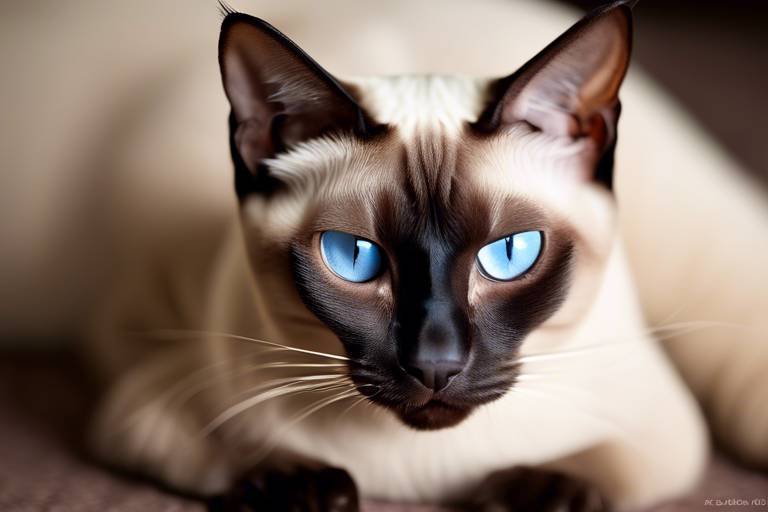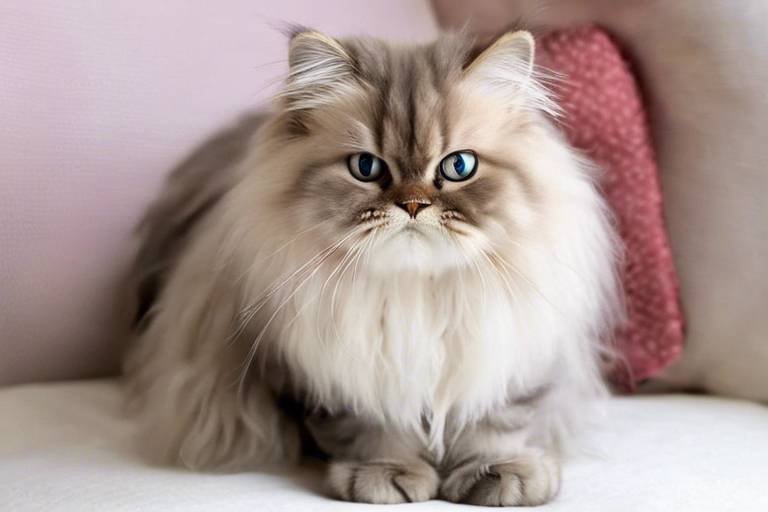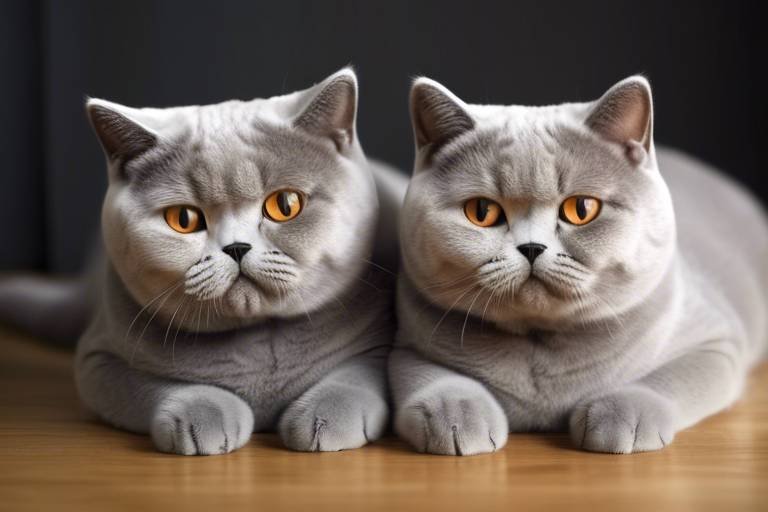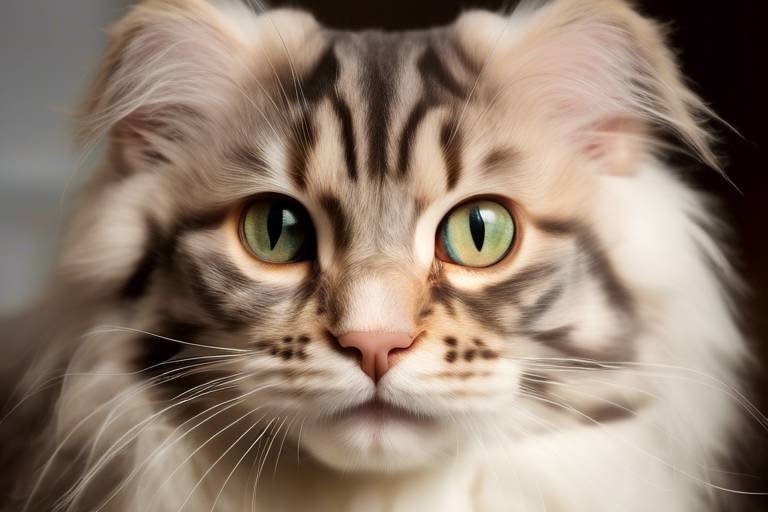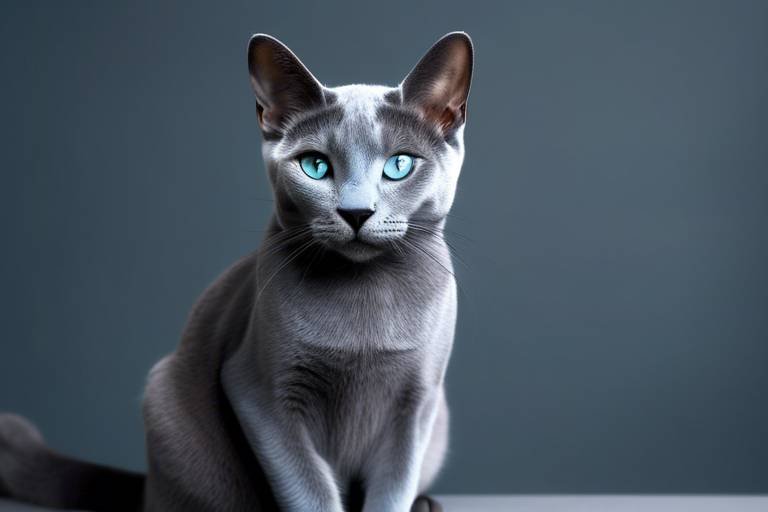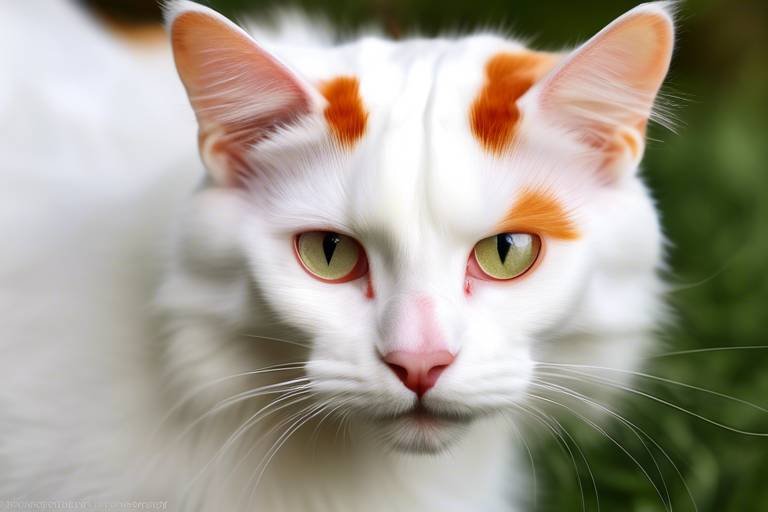Unique Characteristics of the Siamese Cat
The Siamese cat is more than just a pet; it's a captivating companion that enchants with its unique characteristics. Known for their striking appearance, these felines stand out in any crowd. With their sleek, slender bodies and mesmerizing almond-shaped blue eyes, Siamese cats are truly a sight to behold. Their short coat, adorned with distinctive color points on the ears, face, paws, and tail, adds to their allure. But it's not just their looks that make them special; their vocalizations, social behavior, and health considerations also play a significant role in defining this beloved breed.
What makes Siamese cats so fascinating is their vocal nature. Unlike many other cat breeds, Siamese cats are known for their loud and expressive conversations with their owners. They have a way of communicating that is both charming and sometimes demanding. From gentle meows to loud yowls, each sound carries its own meaning, reflecting their needs and emotions. Understanding their vocalizations can deepen the bond between you and your Siamese, making interactions even more rewarding.
Moreover, Siamese cats are incredibly social creatures. They thrive on interaction, whether it's with their human companions or other pets. Their affectionate nature means they often seek out attention and companionship, making them ideal pets for families and individuals alike. It's not uncommon for a Siamese cat to follow you from room to room, always wanting to be part of the action. This social behavior is complemented by their playful antics, which can bring joy and laughter into any home.
However, like all breeds, Siamese cats have specific health considerations that potential owners should be aware of. Common health issues include respiratory problems and dental issues, which can be managed with regular veterinary visits and proper care. By staying informed about these concerns, you can ensure that your Siamese cat lives a long, healthy, and happy life.
In summary, the Siamese cat is a breed that captivates pet lovers with its unique blend of beauty, intelligence, and affectionate nature. Whether you're drawn to their stunning appearance or their engaging personalities, Siamese cats make for wonderful companions. Understanding their characteristics not only enhances your relationship with them but also enriches your experience as a pet owner.
- Are Siamese cats good with children? Yes, Siamese cats are known for their playful and affectionate nature, making them great companions for children.
- How much exercise do Siamese cats need? Siamese cats are energetic and require regular playtime to keep them mentally and physically stimulated.
- Do Siamese cats get along with other pets? Generally, Siamese cats are social and can get along well with other pets if introduced properly.
- What is the average lifespan of a Siamese cat? Siamese cats typically live between 12 to 20 years, depending on their health and care.
- How can I keep my Siamese cat healthy? Regular veterinary check-ups, a balanced diet, and plenty of exercise are key to maintaining your Siamese cat's health.
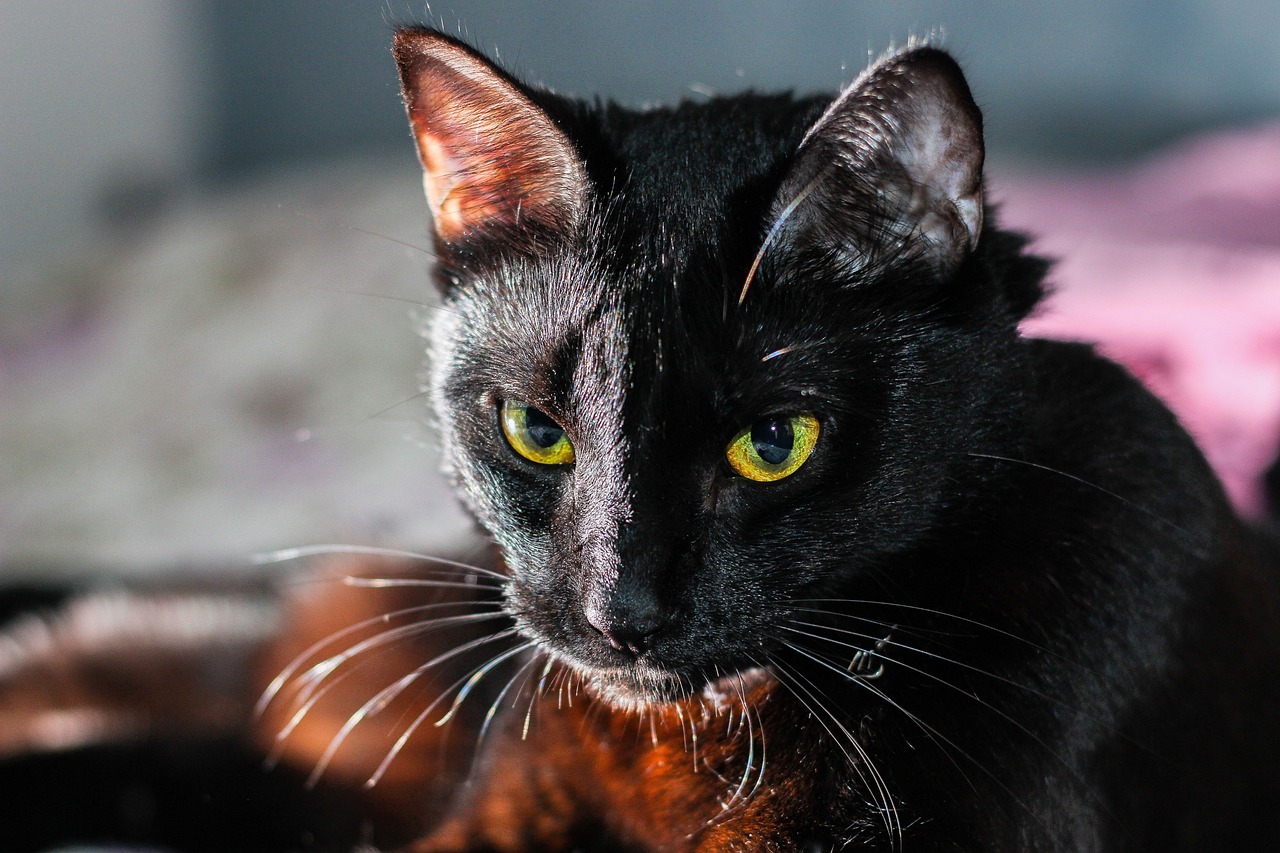
Physical Appearance
Siamese cats are nothing short of a visual delight, captivating cat lovers with their striking looks and unique physical characteristics. Imagine a cat that seems to embody elegance and grace, with a sleek, slender body that moves like a whisper through the room. Their almond-shaped blue eyes are perhaps one of their most enchanting features, often described as mesmerizing and full of expression. These eyes can communicate a range of emotions, from curiosity to affection, making it hard to resist their charm.
Their coat is another remarkable aspect of their appearance. Siamese cats have a short, fine coat that is smooth to the touch, allowing them to be both low-maintenance and incredibly soft. What truly sets them apart are their color points, which are darker shades found on their ears, face, paws, and tail. This unique coloration gives them a distinctive look, resembling a piece of art in motion. The color points can vary, ranging from seal (dark brown) to chocolate, lilac, and blue, each adding to the breed's allure.
One interesting fact about their physical appearance is that Siamese kittens are born completely white. As they grow, their color points develop due to a temperature-sensitive gene that affects pigment production. This means that Siamese cats are like a beautiful canvas that evolves over time, making each one unique.
To give you a clearer picture, here’s a quick overview of their physical traits in a table format:
| Physical Trait | Description |
|---|---|
| Body Type | Sleek and slender |
| Eye Shape | Almond-shaped, vibrant blue |
| Coat Length | Short and fine |
| Color Points | Dark shades on ears, face, paws, and tail |
In addition to their physical traits, Siamese cats are also known for their expressive facial features. Their large ears and angular faces contribute to their overall striking appearance, making them look perpetually alert and curious. This breed is not just about looks; their personality shines through their expressive features, making it easy to see their mood at a glance. Whether they’re feeling playful or contemplative, their appearance reflects their emotions, creating a deeper bond with their human companions.
In summary, the physical appearance of Siamese cats is a harmonious blend of elegance, uniqueness, and expressiveness. Their striking looks not only make them stand out in a crowd but also serve as a testament to their captivating personalities. If you’re considering bringing a Siamese into your home, be prepared for a feline companion that’s as beautiful as it is engaging!
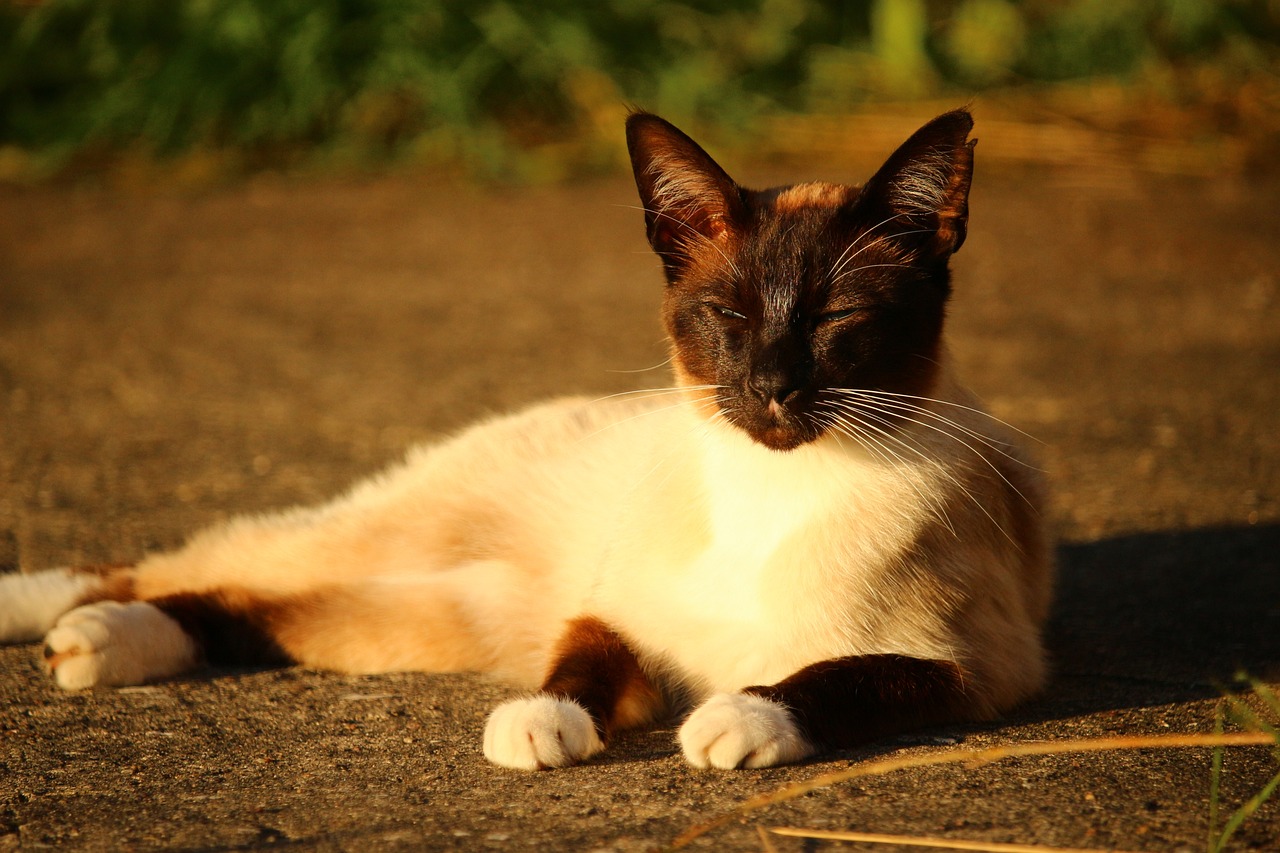
Vocalizations and Communication
Siamese cats are not just beautiful creatures; they are also known for their extraordinarily vocal nature. If you've ever been around one, you might have noticed that they seem to have a lot to say! Unlike many other cat breeds that may communicate through soft purrs or subtle meows, Siamese cats are often described as chatty and expressive. They have a unique way of engaging in conversations with their owners, turning everyday interactions into lively exchanges.
This breed is famous for its range of vocalizations, which can include everything from a gentle meow to a loud yowl. Each sound they make can convey different messages, whether they are hungry, seeking attention, or just expressing their feelings. For instance, a soft, drawn-out meow might indicate that they're feeling affectionate, while a more urgent yowl could mean they're unhappy or want something specific. Understanding these sounds can greatly enhance your relationship with your Siamese companion.
So, what exactly do these sounds mean? Siamese cats have developed a complex language of vocalizations that can be quite fascinating. Here’s a quick breakdown of some common sounds:
| Sound | Meaning |
|---|---|
| Meow | A general request for attention or food. |
| Yowl | Expresses frustration or a strong desire for something. |
| Purr | Indicates contentment and happiness. |
| Chirrup | A playful sound often made during playtime. |
As you can see, each sound has its own unique purpose. This means that as a Siamese cat owner, you are not just a caretaker; you are also a translator of sorts! The more you listen and respond to their vocalizations, the better you can understand their needs and feelings.
But it’s not just their sounds that make Siamese cats such effective communicators. Their body language is equally expressive and can tell you a lot about their mood. For instance, when a Siamese cat arches its back and purrs, it’s a clear sign of happiness. Conversely, if they flatten their ears against their head, they might be feeling threatened or annoyed. By paying attention to both vocalizations and body language, you can create a deeper bond with your furry friend.
Siamese cats are highly social animals that thrive on interaction, not just with their human companions but also with other pets. They often seek out playtime and companionship, making them great pets for families or individuals who can devote time to them. Their social behavior is characterized by a need for constant engagement, which means they might follow you around the house or even try to participate in your activities. This inherent desire for social interaction not only enriches their lives but also enhances the overall atmosphere of your home.
Thanks to their intelligence, Siamese cats can be trained effectively. They are quick learners and enjoy mental challenges. Engaging them in training sessions can be a fun way to bond while also keeping them mentally stimulated. Incorporating tricks, games, and even puzzle toys into your routine can help satisfy their curiosity and need for activity. Remember, a well-engaged Siamese is a happy Siamese!
- Are Siamese cats really that vocal? Yes, Siamese cats are known for their vocal nature and often have a lot to say!
- What do different vocalizations mean? Each sound can convey different messages, from hunger to affection.
- How can I train my Siamese cat? Use positive reinforcement techniques and engage them with mental challenges.
- Do Siamese cats get along with other pets? Yes, they are very social and often enjoy the company of other pets.
Understanding Their Sounds
Siamese cats are renowned for their vocal prowess, and it’s not just about making noise; it’s about conveying a whole range of emotions and needs. When you own a Siamese, you quickly learn that their vocalizations are like a unique language, one that can express joy, frustration, or even a simple desire for attention. Their sounds can vary significantly, from soft chirps to loud, demanding yowls, making it essential for owners to understand what each sound means. For instance, a gentle meow might indicate that your cat is feeling affectionate, while a series of sharp yowls could signal that they want something urgently, like food or playtime.
To break it down further, here are some common vocalizations you might encounter:
- Meow: A classic sound that can range from soft to loud, often used to get your attention.
- Yowl: A prolonged, loud sound that usually indicates distress, discomfort, or a strong desire for something.
- Chirp: A short, high-pitched sound that can express excitement or happiness, often heard during play.
- Trill: A mix between a meow and a purr, typically used as a greeting or to get attention.
Understanding these vocalizations not only strengthens the bond between you and your Siamese but also helps you respond appropriately to their needs. Imagine having a conversation where your partner speaks in a different language; it can be confusing! By learning the meanings behind your cat’s sounds, you become fluent in their feline language, allowing for better communication and a happier pet. Just like humans, Siamese cats have their own personalities, and their sounds can reflect their mood or temperament. Some may be more talkative than others, and that’s perfectly normal.
Moreover, their vocalizations are often accompanied by specific body language, enhancing the overall message they’re trying to convey. For example, if your Siamese is meowing while rubbing against your leg, they’re likely expressing affection and seeking your attention. On the other hand, a yowl paired with a twitching tail could indicate irritation or discomfort, signaling that something might be wrong.
In essence, the sounds of a Siamese cat are not just noise; they are a vital part of their personality and communication style. By paying close attention to these vocalizations and their accompanying behaviors, you can ensure that your feline friend feels understood and loved.
- Are Siamese cats more vocal than other breeds? Yes, Siamese cats are known for being one of the most vocal breeds, often engaging in lively conversations with their owners.
- What does it mean if my Siamese cat is yowling? Yowling can indicate a variety of things, from wanting attention or food to expressing discomfort or distress.
- Can Siamese cats learn to mimic sounds? While they may not mimic human speech, Siamese cats can learn to associate certain sounds with specific actions or responses.
Expressive Behavior
Siamese cats are not just pets; they are little bundles of personality wrapped in fur. Their is one of the most captivating traits that make them stand out among other breeds. Imagine coming home after a long day, and your cat greets you with a series of loud, melodious yowls, almost as if they're recounting their day to you. This vocalization is just the tip of the iceberg when it comes to their expressive nature.
These cats have a knack for communicating their emotions through a combination of vocal sounds and body language. For instance, when a Siamese cat is feeling playful, you might see them darting around the house, pouncing on imaginary prey, or even engaging in a game of chase with their human companions. Their tails will be held high, often twitching slightly, indicating excitement and playfulness. On the other hand, if they are feeling affectionate, they may rub against your leg or curl up next to you, purring softly, which is their way of saying, “I love you.”
Body language plays an equally important role in how Siamese cats express themselves. Here are some common behaviors you might observe:
- Tail Position: A high, upright tail typically signifies happiness and confidence, while a low tail can indicate submission or fear.
- Ears: Forward-facing ears show curiosity and interest, while flattened ears can indicate irritation or fear.
- Pawing: Gentle pawing at your hand or face often means they want attention or affection.
Moreover, their playful antics often translate into their need for interaction. Siamese cats thrive on social engagement, which means they often seek out their owners to play or simply to be near them. They may even follow you from room to room, wanting to be involved in whatever you’re doing. This behavior highlights their desire for companionship and their need to feel connected to their human families.
In conclusion, the expressive behavior of Siamese cats is a delightful mix of vocalizations and body language that paints a vivid picture of their emotional state. Whether they are playfully bounding around the house or curling up next to you for a cozy nap, their personality shines through in every interaction. Understanding these behaviors not only enhances the bond between you and your Siamese but also enriches the experience of having such an affectionate and engaging companion.
- Are Siamese cats good with children? Yes, Siamese cats are generally very affectionate and can be great companions for children, as long as they are socialized properly.
- Do Siamese cats require a lot of attention? Absolutely! Siamese cats thrive on social interaction and can become lonely or anxious if left alone for long periods.
- How can I keep my Siamese cat mentally stimulated? Engage them in interactive play, provide puzzle toys, and consider training them to do tricks to keep their minds active.
Social Interaction
Siamese cats are not just your average feline companions; they are social butterflies of the cat world! Their need for interaction and companionship is one of the most endearing traits of this breed. Unlike many other cats that may prefer solitude, Siamese cats thrive on being around people and other pets. This characteristic makes them incredibly engaging and often leads to some delightful antics that can keep you entertained for hours. Imagine coming home after a long day and being greeted by a cat that seems to have been waiting all day just for you! That’s the magic of a Siamese cat.
These cats are known for their strong bonds with their human companions. They often follow their owners from room to room, wanting to be part of whatever you are doing. It's almost like having a little shadow that is eager to share in your daily life. They are not just looking for attention; they are actively seeking a connection. This desire for social interaction can manifest in various ways, including head-butting, purring, and even playful nudges to get your attention. It's their way of saying, "Hey, I'm here! Let's hang out!"
Moreover, Siamese cats are incredibly expressive, using both vocalizations and body language to communicate their feelings. When they want to play or simply be petted, they might rub against your legs or let out a soft meow. But beware: if they feel ignored, their vocalizations can escalate into loud yowls that demand your immediate attention. It's their unique way of expressing their needs, reminding you that they are social creatures who crave interaction.
To keep your Siamese cat happy and fulfilled, consider engaging them in activities that promote social interaction. Here are a few ideas:
- Playtime: Use toys to encourage play. Interactive toys, like feather wands or laser pointers, can stimulate their hunting instincts and provide a great bonding experience.
- Training Sessions: Siamese cats are intelligent and can be trained to perform tricks or follow commands. This not only keeps them mentally stimulated but also strengthens your bond.
- Socializing with Other Pets: If you have other pets, introducing them to your Siamese can lead to wonderful friendships. Just be sure to supervise their interactions initially.
In summary, the social nature of Siamese cats makes them exceptional companions. They are affectionate, playful, and always eager to engage with their human friends. By providing them with the attention and interaction they crave, you can ensure that your Siamese cat remains happy, healthy, and emotionally fulfilled.
Q: Do Siamese cats get along with other pets?
A: Yes, Siamese cats are generally very social and can get along well with other pets if introduced properly.
Q: How much attention do Siamese cats need?
A: Siamese cats thrive on interaction and companionship, so they require a good amount of attention daily. They love to be involved in your activities.
Q: Are Siamese cats vocal?
A: Absolutely! Siamese cats are known for their vocal nature and will often engage in loud and expressive conversations with their owners.
Q: Can Siamese cats be trained?
A: Yes, due to their intelligence, Siamese cats can be effectively trained. They respond well to positive reinforcement techniques.
Training and Engagement
Training a Siamese cat can be one of the most rewarding experiences for both the cat and the owner. These cats are not just pretty faces; they are highly intelligent and eager to learn, which makes them quite trainable compared to many other breeds. Imagine having a furry companion that not only listens to your commands but also actively participates in fun activities! To kick off the training process, it's essential to establish a routine. Cats, much like humans, thrive on consistency. So, whether it's feeding time, playtime, or training sessions, try to keep a regular schedule.
Positive reinforcement is the name of the game when it comes to training Siamese cats. They respond exceptionally well to treats, praise, and affection. For instance, if you're teaching your cat to sit, reward them with a small treat and enthusiastic praise every time they respond correctly. Over time, they will begin to associate the command with the action, and soon you’ll have a cat that sits on command! This method not only helps in learning but also strengthens the bond between you and your feline friend.
Engagement is equally crucial for these lively cats. Siamese cats are known for their high energy levels and playful nature. To keep them mentally stimulated, consider incorporating various activities into their daily routine. Here are some engaging ideas:
- Interactive Toys: Toys that require your cat to think and strategize can keep them entertained for hours. Puzzle feeders are an excellent choice!
- Training Sessions: Short, frequent training sessions can be both fun and productive. Use clicker training to make it even more exciting.
- Playtime: Dedicate time each day to play with your Siamese. Feather wands, laser pointers, and even simple cardboard boxes can provide endless entertainment.
Another effective way to engage your Siamese is through social interaction. These cats are known to be very social and often enjoy the company of other pets or even their human family members. Consider adopting another cat or even a dog, as long as they can get along. This companionship can provide additional stimulation and help prevent boredom, which is crucial for their emotional well-being.
Lastly, remember that training and engagement should be fun for both you and your Siamese cat. Don’t be afraid to get creative! Use everyday household items for new games or challenges. For example, hide treats around the house and encourage your cat to find them. This not only sharpens their hunting instincts but also engages their minds. The key is to keep the environment enriched and stimulating, ensuring your Siamese cat remains happy and healthy.
Q: Can Siamese cats be trained to walk on a leash?
A: Yes, Siamese cats can be trained to walk on a leash! Start by getting them comfortable with a harness at home before introducing them to the outdoors.
Q: How often should I engage my Siamese cat in play?
A: Aim for at least 15 to 30 minutes of active playtime each day. They thrive on interaction and mental stimulation.
Q: What are some signs that my Siamese cat is bored?
A: Look for signs like excessive meowing, destructive behavior, or a lack of interest in their usual toys. If you notice these, it might be time to spice up their routine!
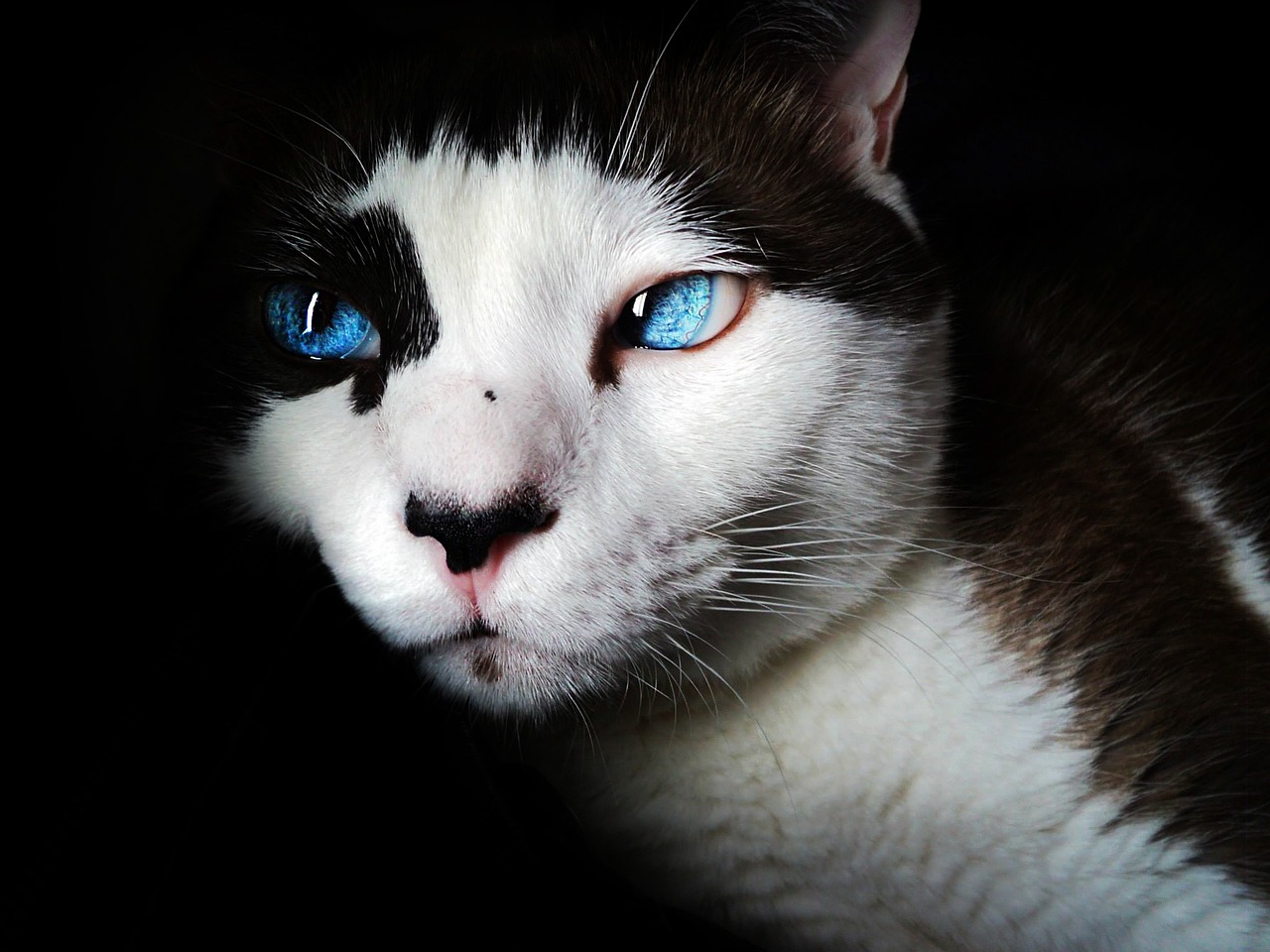
Temperament and Personality
Siamese cats are not just another breed of felines; they are a blend of personality traits that make them truly unique. Known for their playful and affectionate nature, these cats have a way of stealing hearts and becoming integral members of the family. You might find yourself constantly entertained by their quirky antics and vibrant energy. But what exactly makes their temperament so special? Let’s dive into the captivating world of Siamese cats and explore their personality traits that set them apart.
One of the defining characteristics of Siamese cats is their people-oriented disposition. Unlike many other breeds that may prefer solitude, Siamese cats thrive on human interaction. They are known to follow their owners around the house, engaging in whatever activity is taking place. This strong bond with their humans is not just a coincidence; it stems from their social nature. They crave companionship and often form deep attachments with their families. So, if you’re looking for a cat that will cuddle up with you on the couch while you binge-watch your favorite show, a Siamese might just be the perfect fit.
Moreover, their affectionate nature is expressed in a variety of ways. Siamese cats are notorious for their vocalizations, which can range from sweet chirps to loud yowls. These sounds are not just random noises; they are their way of communicating their feelings and desires. Whether they want attention, food, or simply to be petted, they’ll let you know with their expressive voices. It’s almost as if they’re having a conversation with you! In fact, many Siamese owners often find themselves talking back, creating a delightful dialogue that makes the bond even stronger.
But it’s not just their vocal abilities that make them engaging companions. Siamese cats are also incredibly playful and possess high energy levels. They love to engage in interactive play, whether it’s chasing after a feather toy or pouncing on a laser dot. This playful behavior is essential for their mental and physical well-being. Regular playtime not only keeps them fit but also strengthens the bond between you and your feline friend. If you can match their energy, you’ll find that your Siamese cat can be a source of endless joy and amusement.
However, this high energy and need for companionship also mean that Siamese cats can become bored or lonely if left alone for extended periods. They thrive in environments where they can engage with their humans or other pets. If you have a busy lifestyle, consider adopting two Siamese cats so they can keep each other company. This way, they won’t feel neglected and will always have a playmate to interact with, ensuring their happiness and well-being.
In summary, the temperament and personality of Siamese cats make them remarkable companions. Their affectionate and social nature, combined with their playful antics, creates a lively household filled with love and laughter. If you’re ready to welcome a Siamese cat into your home, be prepared for a relationship filled with warmth, chatter, and endless entertainment. They truly are a breed like no other!
- Are Siamese cats good with children? Yes, Siamese cats are generally very good with children due to their friendly and playful nature.
- Do Siamese cats require a lot of attention? Absolutely! They thrive on social interaction and need regular engagement with their owners.
- How can I keep my Siamese cat entertained? Regular playtime, interactive toys, and even puzzle feeders can help keep your Siamese cat mentally stimulated.
- Are Siamese cats prone to any health issues? Like all breeds, Siamese cats can be prone to certain health issues, so regular vet check-ups are essential.
Affectionate Companions
Siamese cats are more than just pets; they are that thrive on human interaction and love. If you've ever experienced the warmth of a Siamese cat curling up beside you, you know that their affectionate nature is truly special. These cats are known for their strong bonds with their owners, often following them from room to room, seeking companionship and attention. It's as if they have a built-in radar for when you need a little extra love!
But what makes them so affectionate? Well, Siamese cats are inherently social creatures. They crave connection, not just with humans but also with other pets in the household. Their playful antics and vocalizations are often attempts to engage you in their world. Imagine coming home after a long day, and there’s your Siamese, perched by the door, ready to greet you with a loud, enthusiastic meow that sounds almost like a welcome song. This is their way of saying, "I've missed you!"
Another fascinating aspect of their affection is how they express it. Siamese cats are known for their unique ways of showing love, which can include:
- Head Butting: A gentle nudge from their head against you is a sign of affection, akin to a loving hug.
- Lap Sitting: They often seek out your lap as their favorite resting place, showcasing their desire for closeness.
- Vocalizing: Their frequent meows and purrs are not just for attention; they are their way of communicating their love and happiness.
Moreover, Siamese cats are incredibly intuitive. They can sense your mood and often respond accordingly. If you're feeling down, they might snuggle closer, offering their warmth and comfort as if to say, "I'm here for you." This emotional intelligence makes them not just pets but true companions who understand and reciprocate human emotions.
It's important to note that their affectionate nature comes with a need for attention. Siamese cats do not do well when left alone for long periods. They thrive in environments where they receive plenty of love and engagement. If you're considering bringing a Siamese into your home, be prepared for a cat that wants to be part of your life—whether that’s joining you for a movie night or participating in your daily activities.
In summary, Siamese cats are affectionate companions that bring joy and warmth into any household. Their unique ways of expressing love, combined with their need for social interaction, make them exceptional pets. If you're looking for a furry friend who will shower you with affection and keep you entertained, a Siamese cat might just be the perfect match!
- Are Siamese cats friendly with children? Yes, Siamese cats are generally very friendly and can be great companions for children, enjoying their playful nature.
- Do Siamese cats require a lot of attention? Absolutely! They thrive on interaction and can become lonely if left alone for long periods.
- How can I encourage my Siamese cat to bond with me? Spend quality time playing, grooming, and talking to your Siamese cat to strengthen your bond.
This article explores the distinct traits of Siamese cats, including their striking appearance, vocalizations, social behavior, and health considerations, providing a comprehensive understanding of this beloved breed.
Siamese cats are known for their striking looks, featuring a sleek, slender body, almond-shaped blue eyes, and a short coat with unique color points. This section delves into their physical characteristics and variations.
Siamese cats are famously vocal, often engaging in loud and expressive conversations with their owners. This section highlights their unique ways of communicating and the meanings behind their sounds.
Siamese cats have a range of vocalizations, from meows to yowls. This subsection examines the different sounds they make and what they signify in terms of their needs and emotions.
The vocal nature of Siamese cats is complemented by their expressive body language. This section explores how their actions convey feelings and intentions, enhancing their communicative abilities.
Siamese cats thrive on social interaction and often seek companionship from their owners or other pets. This part discusses their social behavior and how it impacts their relationships.
Due to their intelligence, Siamese cats can be trained effectively. This subsection offers tips on training techniques and activities to keep them mentally stimulated and engaged.
Siamese cats are known for their playful and affectionate personalities. This section examines their temperament, including their need for attention and how they bond with their human companions.
Siamese cats are often considered pets. Their affectionate nature is not just a trait; it’s a way of life for them! These cats thrive on human interaction and are known to form deep bonds with their owners. Imagine coming home after a long day, and your Siamese is right there at the door, purring and rubbing against your legs, as if to say, “I missed you!” This is their way of expressing love. They follow you around the house, join you on the couch, and even curl up on your lap while you read or watch TV, making every moment feel special.
What sets them apart is their ability to sense your emotions. If you’re feeling down, a Siamese cat will often snuggle closer, almost as if they are trying to comfort you. They have an innate ability to read their human’s mood, which makes them incredibly supportive companions. Their affectionate gestures can include:
- Head-butting to show affection
- Purring softly while being petted
- Bringing you “gifts” like toys or even the occasional caught insect
In essence, having a Siamese cat is like having a little furry therapist who always knows when you need a cuddle or a playful distraction. They are not just pets; they are family members who bring joy and warmth into your home.
These cats are known for their playful antics and high energy. This section explores their playful behavior and the importance of regular playtime for their overall well-being.
Siamese cats, like all breeds, have specific health concerns. This section outlines common health issues associated with Siamese cats and tips for maintaining their health through proper care and veterinary visits.
- Are Siamese cats good for families?
Yes, Siamese cats are generally good with families and children. Their affectionate and playful nature makes them great companions. - Do Siamese cats require a lot of attention?
Absolutely! Siamese cats thrive on social interaction and can become lonely if left alone for long periods. - How can I keep my Siamese cat entertained?
Engage them with interactive toys, play fetch, or even teach them tricks. Regular playtime is crucial for their mental and physical health. - What are common health issues in Siamese cats?
Siamese cats can be prone to certain health issues, including respiratory problems and dental issues. Regular vet check-ups are essential.
Siamese cats are often considered people-oriented pets, and for good reason! Their affectionate nature stands out in the feline world, making them not just pets but true companions. These cats possess a unique ability to bond with their owners, often displaying their love through a variety of charming behaviors. Imagine coming home after a long day; as you open the door, a Siamese cat greets you with a melodious meow that sounds almost like a cheerful welcome. This vocalization is just the beginning of how they express their affection.
One of the most endearing traits of Siamese cats is their tendency to follow their owners around the house. You might find them lounging near you while you work, or they may curl up on your lap as you watch TV. This constant companionship is their way of saying, "I love being around you!" They thrive on human interaction and will often seek out attention, making them ideal for families or individuals who desire a close relationship with their pet.
Moreover, Siamese cats are known for their playful antics, which serve as another form of affection. They often engage in interactive play, bringing toys to their owners or playfully nudging them to initiate games. This playful behavior not only entertains but also strengthens the bond between cat and owner. It's as if they are saying, "Let's have fun together!" Their high energy and enthusiasm for playtime reflect their love and desire for engagement.
In addition to their playful nature, Siamese cats are also incredibly affectionate during quiet moments. They often show their love by purring softly while being petted or cuddled. This soothing sound is a sign of contentment, and it’s not uncommon for them to nuzzle against their owners or gently knead with their paws, reminiscent of a kitten nursing. These actions are their way of expressing trust and affection, making every cuddle session feel like a warm embrace.
To summarize, Siamese cats are more than just pets; they are affectionate companions who express their love in multiple ways, from vocalizations to playful interactions and soothing cuddles. Their need for companionship and their ability to connect emotionally with their owners make them an ideal choice for anyone looking to add a loving feline friend to their home.
- Do Siamese cats require a lot of attention? Yes, Siamese cats thrive on social interaction and require regular attention from their owners.
- How can I keep my Siamese cat entertained? Engage them with interactive toys, play sessions, and puzzle feeders to stimulate their minds.
- Are Siamese cats good with children? Generally, yes! Their playful and affectionate nature makes them great companions for kids.
- What health issues are common in Siamese cats? Siamese cats may be prone to certain genetic conditions, so regular veterinary check-ups are essential.
Playfulness and Energy Levels
Siamese cats are not just your average house pets; they are vibrant bundles of energy that bring a spark of joy into any home. Known for their playful antics, these cats can turn an ordinary day into an extraordinary adventure. Their high energy levels mean they require regular playtime to keep them happy and healthy. Imagine a little furry tornado zooming around your living room, chasing after a feather toy or pouncing on a crumpled piece of paper. This is the delightful chaos that a Siamese cat can bring into your life!
One of the most charming aspects of Siamese cats is their insatiable curiosity. They are like little detectives, always on the lookout for something new to explore. Whether it's a sunbeam streaming through the window or a shadow dancing on the wall, they are quick to investigate. This inquisitiveness not only keeps them active but also stimulates their minds, making playtime an essential part of their daily routine. Engaging them in interactive play can help satisfy their need for mental stimulation and physical exercise.
To cater to their playful nature, it’s important to provide a variety of toys and activities. Here are some popular options:
- Feather Wands: These are perfect for simulating hunting behavior and can keep your Siamese engaged for hours.
- Laser Pointers: A classic favorite, laser pointers encourage your cat to chase and pounce, providing great exercise.
- Interactive Puzzle Toys: These toys challenge their intellect and reward them with treats, keeping their minds sharp.
But don’t be fooled into thinking that all playtime is just about chasing toys; Siamese cats also love to engage with their human companions. They thrive on interaction, and you might find them bringing you toys, asking you to join in their fun. This social aspect of their playfulness makes them incredibly affectionate and strengthens the bond between you and your feline friend. It's almost like having a playful little partner in crime!
However, it’s crucial to remember that their energy levels can sometimes lead to mischief. Siamese cats are known to be quite clever, and if they don’t have enough outlets for their energy, they might resort to climbing curtains or knocking things off shelves just for the thrill of it. Regular play sessions can help mitigate these behaviors by channeling their energy into more constructive activities. Think of it as giving them a job to do—a job that involves fun and laughter!
In conclusion, the playfulness and energy levels of Siamese cats are not just traits; they are integral to their personality. By fostering an environment rich in play and interaction, you can ensure that your Siamese remains a happy, healthy, and well-adjusted member of your family. Just remember, a tired Siamese is a happy Siamese!
- How much playtime do Siamese cats need? Siamese cats thrive on at least 30 minutes of active play each day to keep them mentally and physically stimulated.
- What are the best toys for Siamese cats? Toys that encourage interaction, such as feather wands, laser pointers, and puzzle toys, are excellent choices for Siamese cats.
- Can Siamese cats play alone? While they can entertain themselves, Siamese cats are very social and often prefer playtime with their human companions.
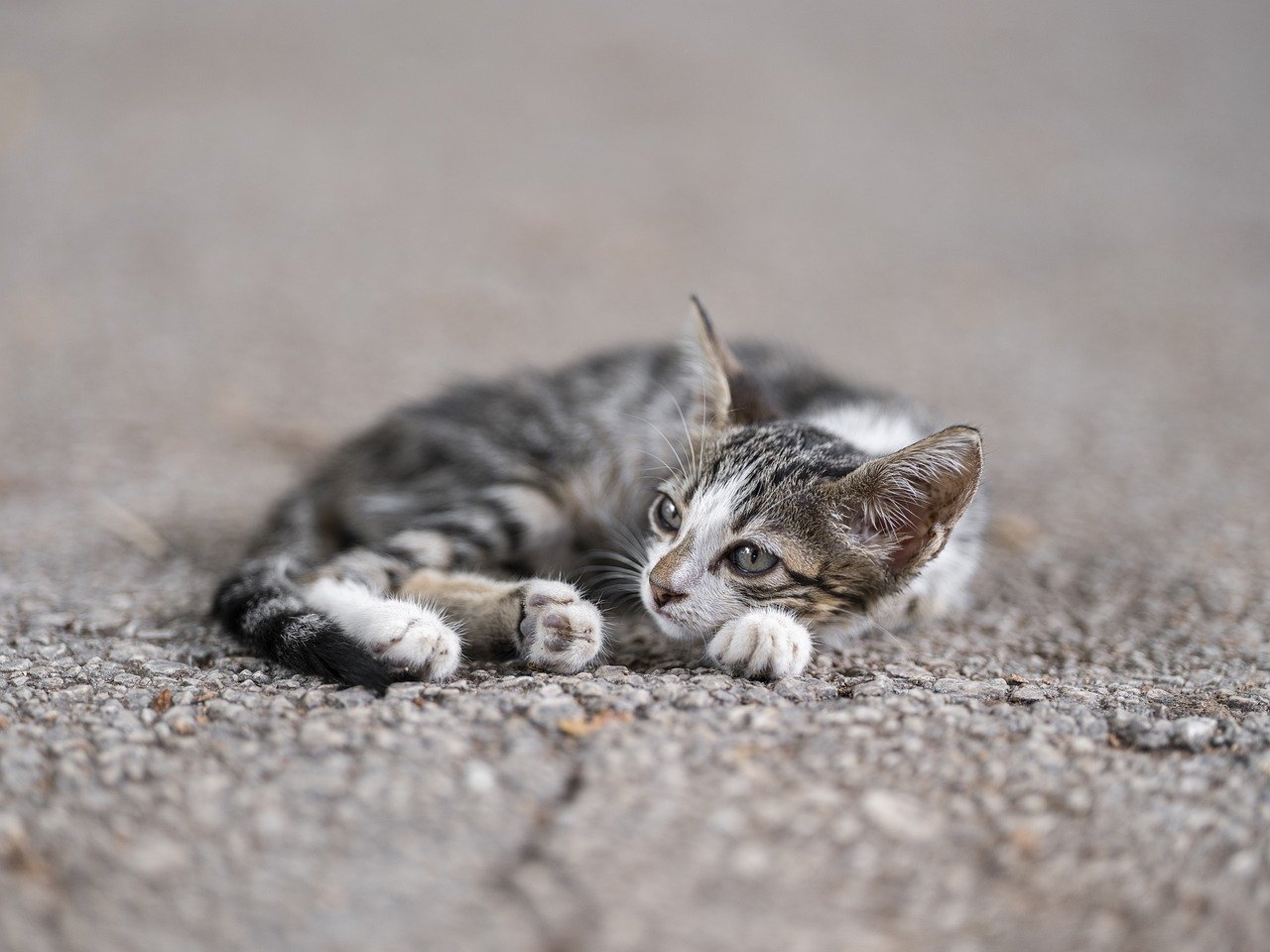
Health Considerations
Siamese cats, like all breeds, come with their own set of health considerations that every prospective owner should be aware of. While they are generally robust and lively, certain genetic predispositions can lead to health issues that may affect their quality of life. Understanding these concerns is crucial for any Siamese cat owner who wants to ensure their furry friend enjoys a long, healthy life. One of the most common health issues seen in Siamese cats is respiratory problems, particularly due to their unique skull shape, which can lead to issues like brachycephalic airway syndrome. This condition can cause breathing difficulties, especially in hot or humid weather.
Another prevalent concern is hypertrophic cardiomyopathy (HCM), a heart disease that affects many cat breeds, but is particularly noted in Siamese cats. HCM causes the heart muscle to thicken, which can lead to serious complications, including heart failure. Regular veterinary check-ups are essential for early detection of such conditions. Additionally, Siamese cats are also prone to dental issues, so maintaining good oral hygiene is vital. Regular brushing and dental check-ups can help mitigate these problems.
Moreover, Siamese cats have a higher likelihood of developing certain types of cancers, such as lymphoma. Being aware of the signs of illness, such as changes in appetite, weight loss, or unusual behavior, can help in catching these issues early. It’s also worth noting that their sleek bodies can make them more susceptible to obesity if not properly managed. A balanced diet and regular exercise are key components in keeping your Siamese cat at a healthy weight.
To give you a clearer picture, here’s a quick overview of common health issues associated with Siamese cats:
| Health Issue | Description | Preventive Measures |
|---|---|---|
| Respiratory Problems | Issues related to their unique skull shape. | Avoid hot environments; regular vet check-ups. |
| Hypertrophic Cardiomyopathy | Heart disease leading to thickening of the heart muscle. | Regular heart check-ups; monitor for symptoms. |
| Dental Issues | Prone to dental diseases. | Regular brushing; dental vet visits. |
| Cancers | Higher likelihood of developing certain cancers. | Monitor for unusual behaviors; regular vet visits. |
| Obesity | Can lead to various health problems. | Balanced diet and regular exercise. |
In conclusion, being informed about these health considerations can help you provide the best care for your Siamese cat. Regular veterinary visits, a balanced diet, and an active lifestyle are essential components in keeping them healthy. Owners should always stay vigilant and proactive about their pet's health, ensuring that any signs of illness are addressed promptly. After all, a healthy Siamese is a happy Siamese!
- What is the average lifespan of a Siamese cat?
The average lifespan of a Siamese cat ranges from 12 to 20 years, depending on genetics and care. - Are Siamese cats prone to any specific diseases?
Yes, they are more susceptible to respiratory issues, hypertrophic cardiomyopathy, and certain cancers. - How can I maintain my Siamese cat's health?
Regular vet check-ups, a balanced diet, and plenty of exercise are key to maintaining their health. - Do Siamese cats require special grooming?
Due to their short coat, they require minimal grooming, but regular brushing can help reduce shedding.
Frequently Asked Questions
- What makes Siamese cats unique in appearance?
Siamese cats are renowned for their striking looks, which include a slender body, almond-shaped blue eyes, and a short coat with distinctive color points. Their unique coloration and elegant build make them stand out among other breeds.
- Why are Siamese cats so vocal?
These cats are famous for their vocalizations and often engage in loud and expressive conversations with their owners. Their vocal nature is a form of communication, and they use various sounds to express their needs and emotions, making them quite the chatty companions!
- How do I understand my Siamese cat's sounds?
Siamese cats produce a range of vocalizations, from soft meows to loud yowls. Each sound can signify different emotions or needs, such as hunger, playfulness, or a desire for attention. Paying attention to the context and tone can help you understand what your cat is trying to communicate.
- Are Siamese cats good with other pets?
Yes, Siamese cats are known for their social behavior and often thrive on companionship. They can get along well with other pets, provided they are introduced properly. Their friendly nature makes them adaptable in multi-pet households.
- How can I keep my Siamese cat mentally stimulated?
Due to their intelligence, Siamese cats benefit from training and engagement. You can keep them mentally stimulated through interactive toys, puzzle feeders, and regular play sessions. Engaging their minds is essential for their happiness and well-being.
- What is the temperament of Siamese cats like?
Siamese cats are known for their playful and affectionate personalities. They thrive on attention and often form strong bonds with their human companions, making them loving and devoted pets.
- Do Siamese cats require a lot of playtime?
Absolutely! These cats are high-energy and love to play. Regular playtime is crucial for their physical and mental health, helping to prevent boredom and destructive behavior.
- What health issues are common in Siamese cats?
Like all breeds, Siamese cats can be prone to specific health concerns, such as dental issues, respiratory problems, and certain genetic conditions. Regular veterinary check-ups and proper care can help maintain their health and catch any issues early.

